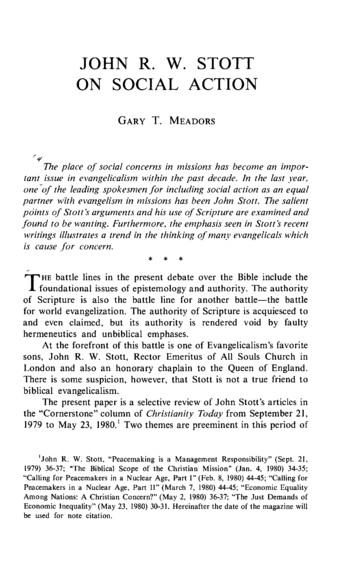
Transcription
When Everything Is Missionsby Denny Spitters & Matthew Ellisoncopyright 2017 Pioneers-USA & Sixteen:FifteenISBN: 9780989954549Scripture quotations are from The Holy Bible, English Standard Version (ESV), copyright by Crossway, a publishingministry of Good News Publishers. Used by permission. Allrights reserved.This book was published by BottomLine Media, an imprint ofPioneers, that celebrates the “bottom line” of God’s covenantwith Abraham: “I will bless all nations through you.” To purchase other BottomLine titles, visit Pioneers.org/Store. Thisbook is available in ebook format on Apple iBooks and Amazon Kindle.Printed in the USA. Reproduction in whole or in part, in anyform, including storage in a memory device, is forbidden without express written permission, except that portions may beused in broadcast or printed commentary or review when attributed fully to author and publication names.
PRAISE FOR WHEN EVERYTHING IS MISSIONS“Pastors, mission committees, mission agencies, and church leaders would do well to read the new (and short!) book, When Everything Is Mission. . Spitters and Ellison remind us that if we think allof this is missions we will end up neglecting the very task laid out forus in the Great Commission. When everything is missions, missionsgets left behind.”— Kevin DeYoung, Senior Pastor, Christ Covenant Church,Mathews, North Carolina“This brief, powerful and provocative book should be read by every North American pastor. Spitters and Ellison contend that whenevery Christian is a missionary and every ministry is missions, wegut the mandate to reach all nations. Check it out to discover whythey think such is the case.”— J. D. Payne, Pastor for Church Multiplication, The Church atBrook Hills, Birmingham, Alabama“I welcome the publication of this book. Among many other insightful contributions, Denny and Matthew get the important distinction between a popular understanding of “missionary” and thetechnical understanding of “missionary.” They rightly insist that wedon’t obscure the technical understanding and argue biblically forthe importance of maintaining it. May this book be used to recruit,train and mobilize God’s people toward crossing cultures to bringthe love and justice of Jesus to the unreached and unengaged peoples of the world.”— Tom Steller, Pastor for Leadership Development,Bethlehem Baptist Church; Assoc. Professor of New Testament;Senior Advisor; Dean of Global and Alumni Outreach,Bethlehem College and Seminary, Minneapolis, Minnesota“It’s difficult to fathom that a practice as essential and traditional to the church through the millenia as ‘missions’ would require afresh update. Yet, that is is exactly what is needed today and just whatDenny Spitters and Matthew Ellison set out to do. Through a series3
of seven critical questions, the authors will challenge how you thinkabout, and more importantly, what you do about taking the good newsof Jesus to those who have never heard. This book is both theologically deep and practically wide. It’s a must read for preaching pastorswho long for clarity in exhorting the local church to live on missionwith Jesus.”—Dave Bruskas, Lead Pastor, North ChurchAlbuquerque, New Mexico“Denny Spitters and Matthew Ellison have done the churches ofthe new millennium a great service. When Everything Is Missions isjust the book for churches struggling with how to envision and fulfill their part in God’s global purposes in the world. In it they willfind that fine balance of the theoretical and conceptual based on arock-solid understanding of the Scriptures, combined with practical and proven steps that any church can take to get in the game anddo its part in the Great Task. I recommend it highly.”— Gary Corwin, Missiologist with SIM International andAssociate Editor of Evangelical Missions Quarterly“For far too long many churches have become either distracted orsidelined by prevailing misconceptions of what their mission to theworld should be. Thankfully through this book, Spitters and Ellisonhave taken up the banner of giving much needed correction to misunderstandings and mistaken mission practices that have becomeprevalent in many church mission programs. Tactfully yet candidly,the authors tackle these issues in a clear and helpful manner.”— Marvin Newell, Senior Vice-President of Missio Nexus“One of my mentors frequently reminds me, ‘Where there’s a mistin the pulpit, there’s a fog in the pew.’ Nowhere are these words moreapplicable than in relation to the mission of the Church. The healthand impact of the Church has always correlated to the clarity of hermission. Who has God called us to be, and what has he commandedus to do? In a time of growing confusion, particularly in the West,about the nature of missions and the role of missionaries, DennySpitters and Matthew Ellison turn on the fog lamps. This book willsharpen your perspective, as a church or mission leader, with regardto one of the watershed issues of our time.”— Steve Richardson, President of Pioneers-USA4
“The first years of the 21st century have seen more than 300 movements, mostly in the global South. Many of these movements represent an engagement with unreached or unengaged people groups ofurban social segments. All of these movements are shaped by kingdom values and lifestyles, as well as a clear kingdom-of-God visionregarding finishing the task. At the same time, one of the serious challenges of the global North church over the last decades is sometimescalled mission drift. In When Everything is Missions, Denny Spitters,and Matthew Ellison take on several critical “drift” issues. To thistask they bring both biblical clarity and a passionate call for kingdom-minded churches to embrace the sacrifices required to makedisciples and plant churches everywhere people are living and dyingwithout a viable Jesus option.”— Jerry Trousdale, Director of International Ministries, CityteamInternational; author of Miraculous Movements: How Hundreds ofThousands of Muslims are Falling in Love with Jesus“When we love deeply, it requires we think deeply. Denny andMatthew’s love for the nations compels them to think deeply aboutwhat this means. This book will lead you into a conversation aboutmissions. God’s love for the nations demands our lives, our soul, ourall. Grab this book to engage your heart and mind in deeper engagement among the nations.”— Pastor Phil Auxier, Crestview Bible Church Hutchinson, Kansas“The truth can sting. In an age where you can go far and wide inthe Church and never hear about the Great Commission, this bookgives a good hurt, and a needed one. Exhortations and solutions tofirst-world problems are fine, but they are not the full story. Hopefully, this book will penetrate both pulpit and pew to provide a catalyst for world-rocking change. Read it and weep over our selfishness, then get going.”— Pastor Chip Lusko, Calvary Chapel“As Matthew and Denny clearly demonstrate, the Western portion of God’s earthly body has been infected with cultural valuesthat downplay clear definitions and dilute distinctions that God hascreated to reflect His glory among the nations. Although the Spirit-guided examination, diagnosis, and strong medicine they recommend will be painful for many individuals and churches to hear and5
receive, When Everything Is Missions is precisely what the GreatPhysician knows His people need to fulfill His mission.”— Pastor Jeff Jackson,Shepherd’s Staff Mission Facilitators“In over forty years in local church ministry I have seen a growing number of churches focusing more on methodology of missionsrather than the biblical foundation of missions. The result has beena diluted global ministry. When Everything Is Missions pinpoints thecritical issues that need to be evaluated. It is very practical, providing questions for continued dialogue and evaluation. Here is a callto reaffirm foundational truths and practices. I highly recommendthis book as an important tool for a local church to have an effectiveglobal impact.”— Steve Beirn, author of Well Sent: Reimagining the Church’sMissionary-Sending Process; Global Ministries Pastor CalvaryChurch, Lancaster, PA
CONTENTSFOREWORD. 11INTRODUCTION. 151. DO OUR DEFINITIONS MATTER?. 252. WHAT IS OUR MISSION?. 333. WHY ARE WE INVOLVED IN MISSIONS? . 494. IS EVERY CHRISTIAN A MISSIONARY? . 655. HOW ARE MISSIONARIES SENT? . 816. SO WHAT?. 917. WHAT NEXT? . . 107APPENDIX A: THINKING DEEPLY. 123APPENDIX B: RECOMMENDED RESOURCES. 127ACKNOWLEDGEMENTS. 131ABOUT THE AUTHORS. 135NOTES. 136ENDNOTES. 137
If everything is mission, nothing is mission.If everything the church does is to be classed as“mission,” we shall need to find another term. 1— Stephen NeillIt would seem more biblical to say, ‘If everythingis mission everything is mission.’ [E]verything a Christian and a Christian churchis, says, and does should be missional in itsconscious participation in the mission of God inGod’s world.2— Christopher Wright
FOREWORDAs a teacher,every semester for the last 21 years I haveasked college students, “What is the kingdom of God?”More than 90 percent of the students reference a place(heaven). Though the kingdom of God is arguably the centralteaching of Jesus (see Acts 1:3) as well as Paul (see Acts 28:3031), most Christian students have no clue what the wordsmean. That doesn’t stop them from using this term on a regular basis as if they know exactly what it means.I’ve also asked thousands of students for a biblical definitionof a disciple or discipleship. Usually they answer with a contemporary definition of the day, never referring to Christ’sdescriptions of a disciple. My own denomination went downsuch a road in the 1980s with a series of workbooks and anhour on Sunday evenings called Discipleship Training whichmade everyone who attended believe they were being discipled even though the program lacked much resemblance tobiblical discipleship.In 40 years of ministry I’ve been amazed at how casual theChristian community can be in using biblical terms that arerarely fully defined or only superficially defined through theChristian cultural trends of the day. In addition, many of usmay tend to accept and parrot ideas and definitions we hearfrom a stage on Sunday mornings without much criticalthought.11
WHEN EVERYTHING IS MISSIONSYet how we define words matters. In the Christian community, defining words give direction to our faith and practice;words shape our understanding of the ultimate purposes ofGod to which our communities of faith are dedicated. Gooddefinitions energize our efforts and call us to unity.I am passionate about teaching and love to see my studentsintegrate discipleship seamlessly into every area of their lives.Encouraging them to disregard or do away with definitions,however, does them a great disservice.I teach a class on the global context of the Christian faith.When we finish the semester I ask my students if they believethat every Christian is a missionary and 99 percent say yes.May our mission definitions Then I ask them if they think Ibe driven not by our personal believe that everyone is a missionary. The same 99 percentinterests, prejudices, andsay yes. They are shocked whenpreferences, but by theI say I don’t believe that everypassions and purpose of the one is a missionary. I do believethat every follower of ChristGod of all nations.is to live strategic intentionallives engaged in God’s globalpurpose both locally and internationally every day. Does thatmake them missionaries? I would say it’s not the same thing.Denny Spitters and Matthew Ellison tackle these very questions. What do the terms missions and missionary mean?What do we mean when we use them? Is everything we domissions? Is every Christian essentially a missionary?As you wrestle with the questions Denny and Matthew raise,my prayer is that you will do so with an open and critical mindas well as a gracious, understanding heart. May this book spuryou on! Every generation needs voices that will challenge contemporary trends that seem to be rooted in a weak or shallowapproach to understanding Scripture and history. We need to12
Forewordbe alert to our human tendency to adopt seemingly new concepts, support them with proof texts, bolster them with weakarguments, and then find someone in the church to championthe idea and integrate these concepts into our existing cultureand programs, thinking we are moving ahead.In such a way, far too many churches and believers havejustified pursuing only their personal passions disconnected from the global context of the mission of God and His ordained methods for accomplishing His purposes. This is justwhat happened in far too many of the churches that embraced“missional” language as it came in vogue without participatingin the rigorous exercise of examining the Scriptures for direction on engaging with the mission of God.The task of definition is not one that should be accomplished in isolation or by only the present Christian generation. Many have gone before us; we can rejoice that we havea great cloud of witnesses. Any attempt to define our missionrequires a careful study of biblical languages and an accurateunderstanding of biblical context, history, and the trajectoryof the apostolic faith.This book tackles a core issue that relates to the very DNA ofthe Church. It calls us to rediscover and embrace the centralplot of the story of God, His Church, and her role in God’s mission. May our mission definitions be driven not by our personal interests, prejudices, and preferences, but by the passionsand purpose of the God of all nations. My prayer, my deephope, is that this book will be catalyst for critical thought andconversation, solid biblical exegesis, and faithful applicationin the Church.— Jeff LewisDirector of MobilizationCalifornia Baptist University13
INTRODUCTIONT7 p . m . m e e t i n g at First Christian Church seemedto race; it seemed as if only 30 minutes had passed. Johnlooked up at the digits: 8:37. His stomach was churning.Why was this so difficult for him?heAs Executive and Missions Pastor he knew the facts. Thechurch had a 150,000 budget deficit. The missions fund contained 200,000. They would need to balance the budget nowand cut the support of five missions workers who, for all thetime and money they cost, had shown poor results or returnon investment.John’s training and background had made him adept atreading a profit-and-loss report. He got it. Board ChairmanJim Taylor’s curt statement and Pastor Steve’s approving nodmade things quite clear; these cuts had to happen.Still, a battery of conflicting emotions, Bible verses, books hehad read, and personal convictions he wasn’t quite sure aboutmade him unsteady, unsure of what it was he even believedabout missions after five years in his role. Meetings like thissucked the life out of John not just because they meant making tough decisions but also because they left him with the distinct impression that nobody, including himself, really evenunderstood what missions at FCC was all about.He was especially uneasy with the fervor of those who stated, “Every ministry in our church is a missions ministry; ourchurch is a mission. We are a missional church.”15
WHEN EVERYTHING IS MISSIONSOn the surface it sounded great, and he had embraced theseconcepts for the past seven years since Pastor Steve had become their new pastor. Yet, frankly, as John thought about theardor behind the “everybody is a missionary” concept, and themetamorphosis of FCC into a “missional” church, the mantra seemed to over-promise and under-deliver. He couldn’t shake thisJohn, I see nothought. It made his stomach ache adifference whatsoever little more.between sharingthe gospel here orsomewhere else.As John offered a mild protestagainst using the missions fund tocover the deficit, one board member had blurted out, “John, I seeno difference whatsoever betweensharing the gospel here or somewhere else. Sharing thegospel is missions. Missions is doing evangelism. Doesn’tActs 1:8 mention Jerusalem as well as the ends of the earth?What’s the difference? We have people at home, right here,all around us who are unreached—this is our mission fieldand everything our church does IS missions!”Any protests to that seemed hollow. This is our mission fieldand everything is missions, period.As Missions Pastor, John was leading missions mostly by creating more programs and activity. He had bypassed the time, energy, and effort of any process that would define a compelling,biblical, definition of missions for FCC, and this meeting was areflection of that. Maybe the cart was in front of the horse.The next morning John woke up thinking about FCC, its history, and its history in missions, as well as his own history atthe church; maybe these would shed some light on what happened at the meeting.John was a favorite son at FCC. His parents, married therein 1969, still attended. He grew up at FCC and had a lot of hislife invested in his church. He married Jo there in 1995.16
IntroductionSince it began in 1956, First Christian Church had beenknown as a missions-minded church. Ten local families joinedwith a bi-vocational pastor to plant the church during thepost-war baby boom. Immediately they started supporting amissionary family in Peru. By 1970 FCC was a church of 400that embraced sharing the gospel by sending missionariesoverseas. “Missions” meant saving foreigners overseas.Due to its premier location in a fast-growing suburb, FCCbecome a well-known mega-church of 2,000 by 1985. Johnwas only 12 at the time but well remembered the annualmission conferences of those years, headlined by strangevisitors from countries he had never heard of. As giving increased, the mission budget grew to support more than 20families, couples, or individual missionaries. The belief wasthat more money meant more missionaries and more missionaries meant more missions.But by 2006, with 4,000 attendees and a missions budget of 1 million to support some 70 workers, FCC was having issuesthat would change its future dramatically.Discipleship at FCC meant becoming a member; evangelism and outreach meant giving a sacrificial faith pledge tomissions. Few could remember anyone new coming to Christthrough the influence of church members during the last decade. Transfer growth and a great preaching pastor had sustained them.The last five years had been stagnant, though, and the 2007economic downturn brought on the deficit that required suchcuts now. To complicate matters, a youth leader had been letgo for improper use of church funds, leading a growing groupof families to depart for other churches with better programsfor their kids. Attendance was slowly spiraling down.The year 2007 was also when the pastor of 25 years retiredand church leaders began looking for a new pastor who couldstem the tide.17
WHEN EVERYTHING IS MISSIONSThey found their answer in 32-year-old Steve Cates. A passionate communicator, he outlined a vibrant vision for a “missional” church where discipleship and missions meant “beingon mission with God in your own context.” In 2010 Pastor Steverecruited John to oversee the staff as Executive Pastor, and aftera year John took on the role of Missions Pastor as well.When he came on board John found FCC more fragmented than he had realized. He was aware of some of the strifeand disunity that had developed between the pastor, churchleaders, and church body, especially in the area of “missions.”Pastor Steve had told him as much. Missions “faith pledges”were down and notices were sent to 20 foreign workers communicating that they were on the bubble for a support reduction or termination unless they could show more significant,missional results.John shifted more and more missions funding toward “native missionaries” who could do mission work for less thansending an American family overseas. The security, cost, andtraining issues made hiring indigenous national workers agreat return on investment.Pastor Steve was getting frustrated with the church’s lack ofresponse to his missional paradigm. His desire to turn FCCinto a disciple-making church where people shared the gospel within their work, school, and neighborhood context wasstalled if not suspended. He believed that if the congregationwould embrace living, working, and thinking as missionaries,results would follow. They hadn’t.Pastor Steve believed that all missions and evangelism activity fit into concentric circles. Serving at home, first andforemost (your “Jerusalem,” in Acts 1:8 terms), was the key tomission. He had decided long ago that most of the talk aboutmissions was semantics; sharing the gospel was all that wasimportant, and it didn’t matter where. When he talked aboutoutreach, he regularly said, “Missions is the mission of the18
Introductionchurch!” With all of the “lost” in their city, shouldn’t evangelism be the main focus and mission of the church—the centralreason for its existence? Aren’t evangelism and missions essentially one? This story may describe the reality for some of our churches. Church leaders may be uncertain if they should fight toprotect old paradigms and programs or jettison them asdeadweight in a new and changing world. Many churchesfind themselves at a loss to define theirglobal mission. Others have becomeMany churches findso ingrown with all of the problems ofthemselves at aexistence, survival, and relevance thattheir mission efforts are all about theirloss to define theirchurch. Shared language may not indiglobal mission.cate shared understanding, with cleardefinitions of discipleship, evangelism,outreach, missions, missionaries, missional, and mission ofGod rarely found, even or maybe especially in churches thatproclaim all of us are missionaries and all our ministriesare mission.One of the obstacles is that processes like building consensus, hammering out definitions, and developing policies thatreflect a shared understanding can be slow, painful work. If weplace a higher value on getting things done, we may prefer tospend our time and energy responding to missionary needsand funding requests as they come rather than taking the timeto invest in a process of biblical discovery that might lead to acoherent and compelling understanding of our mission whichcould guide all those decisions and activities.We contend that many churches do not do missions well because they don’t think about missions well. As a result, manyNorth American churches miss much of their opportunity tobe part of the global plans God has for His whole Church.19
WHEN EVERYTHING IS MISSIONSIf words have meaning, then their definitions and uses matter. When everything is missions, some of the most central aspects may be lost or buried—such as sending our own to makedisciples and plant churches cross-culturally. An over-emphasis on getting bang for our buck may also lead us to ministries that make us feel good or seem to provide a greater return on investment. Some of our churches leave missions toour denominations and networks orpartner with ministries that offer usWe want to suggestlow-cost opportunities to sponsora series of basicmissionaries or projects far away. Yetdoes outsourcing missions come withquestions thathidden costs, perhaps at the expensecan help churchesof our own souls?and their leadersframe a process ofdiscovery, design, anddeployment in mission.In many areas of church ministrywe are careful to define what we aretrying to accomplish. Global outreach, however, often seems to beexempt from such attentions. Butdoes it have to be that way? In thisbook, we want to suggest a series of basic questions that canhelp churches and their leaders frame a process of discovery,design, and deployment in mission, a process essential for ahealthy, unified, dynamic missions vision that flows fromthinking about missions well. Do our definitions matter? What is our mission? Why are we involved in missions? Is every Christian a missionary? How are missionaries to be sent? So what? What is at stake? What next? What might our next steps be?20
IntroductionEven as we raise these simple but challenging questions,we want to affirm churches that are doing the work of missions from the place of thinking well about missions. Wehave observed many churches whose elders, boards, pastors, and church missions leaders have been awakened bythe Scriptures and embraced clear thinking about missionsand the local church. It is highly rewarding to see churchesmove from passive to proactive participation in missions,no longer focused on just money and programs. May yourtribe increase!If we could place our hearts on the page, they would showyou that we love God’s Bride, the Church of which He is theHead and the Bridegroom of us all. He has been on missionas the missionary God ever since Genesis, exhibiting His greatwisdom from before time began. We adore and glorify the miraculous way He has pursued, called, and chosen each of us tobe in His family. Despite the hell-deserving sinners we are, Hehas opened our eyes to the good news of salvation performedin the person and work of Jesus Christ, and we have embracedHim as “the power of God unto salvation to everyone who believes” (Romans 1:16). To see Him passionately worshippedby every tribe, tongue, and nation for this incomparable act ofgrace is our motivation for mission.While we will directly challenge some assumptions surrounding the growing assumption or conviction that “everyChristian is a missionary and every ministry is missions,” wedo so in an attitude of prayer that God will give us gracious andhumble hearts of expression, and that we as authors of thisbook will treat His Bride and each reader with all of the graceGod has shown us.Are you a missions or church leader, involved vocationally in a defined ministry role or faithfully serving Christ asyou represent Him at school, work, or neighborhood? Pleaseknow that our words and concepts come without any desireto give you a “beat down” about missions in any arena. When21
WHEN EVERYTHING IS MISSIONSwe speak about the Church, both of us include ourselves in itsbrokenness and its beauty.We realize others much more qualified than we are see someof these issues very differently. We will gladly receive feedbackand dialogue, especially if it motivates our churches towardgreater activity among the unreached and unengaged. We arecommitted to creating a conversation about this topic that willstimulate the entire Church into focused, thoughtful activitywhere thinking comes before doing.We write from a North American context, though the struggles we describe may extend to other regions as well. We viewthe North American Church’s contributions to missions withthanksgiving and are moved with joy by the results of her pastvision and sacrifice as she pursued the nations with the gospel.While we want to see the missions efforts of the North American church revitalized, we reject any notion of cultural superiority and rejoice to see the global Church take up the mantleof seeing “the whole church take the whole gospel to the wholeworld.” The days of “from the West to the rest” are over.We greatly appreciate much of what we have seen in the “missional” church movement of the past decade. Pastors, teachers,and ministry leaders identified with this movement have exhorted the Church and all believers to be “on mission with God” tomake disciples in our own contexts. We find this commendableand praiseworthy; it offers a great hope for future generations ofthe Church. We embrace the exhortation of these leaders whohave called us to make the discipleship process central to ourobedience to the Great Commission. Careful examination of Jesus’ earthly ministry makes it abundantly clear that the processof making disciples was the center of His five commissioningstatements and exhibited by the enormous quantity of time Heinvested in His own disciples.Yet we are concerned that an uncritical use of words, andin particular a lack of shared definition for the words mission,22
Introductionmissions, missionary, and missional, has led to a distortion ofJesus’ biblical mandate, ushered in an everything-is-missionsparadigm, and moved missions from the initiation and oversightof local churches to make it the domain of individual believersresponding to individualized callings. What does this imply forthe future of North American missions efforts?In defining missions poorly, past generations of Christianshave sometimes made missions about money, power, andcounting converts. In our own generation, a strong embrace ofthe everything-is-mission paradigm has sometimes led us to ahumanitarian mission devoid of the gospel. While “everybodyis a missionary” thinking has been intended to level the playing field for greater participation in making disciples, has thisinclusivism had another, unintended result, at times? Has itled to a serious decline in interest in and support for apostolic,pionee
When Everything Is Missions is just the book for churches struggling with how to envision and ful-fill their part in God’s global purposes in the world. In it they will find that fine balance of the theoretical an










